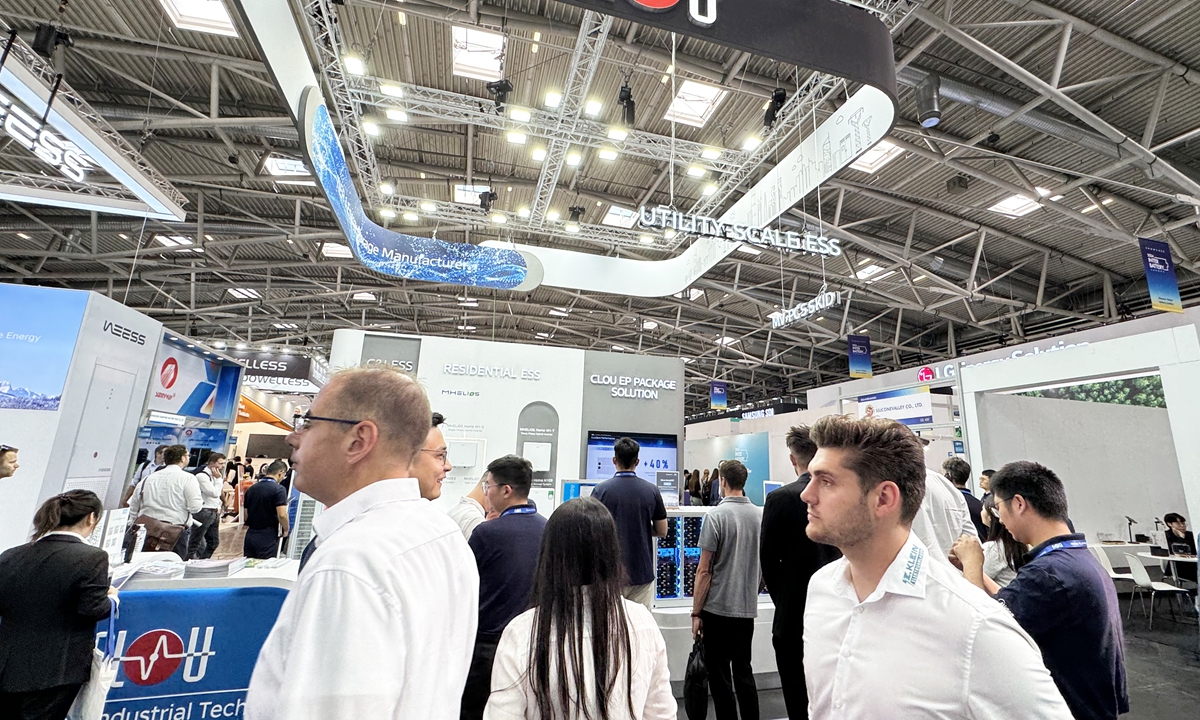
The booth of Shenzhen CLOU Electronics at ees Europe 2024 held in Munich, Germany on June 19, 2024 Photo: Courtesy of Shenzhen CLOU Electronics
New US tariffs will not hinder overseas expansion, said senior executives from one of China's leading energy storage firms, after the US announced new tariff rates on an array of Chinese imports, including a major hike in levies on Chinese energy storage.
"The US tariffs on energy storage only push us to do more in terms of output and layout. They will not change the fact that China has a leading global position in energy storage, and they will not change the fact that the US is dependent on the Chinese market," Shawn Zhang, head of overseas business at Shenzhen CLOU Electronics, told the Global Times in a recent interview.
"We have confidence in our future development, and I believe the industry will still be developing healthily," Zhang added.
The comments came after US President Joe Biden announced in May a quadrupling of tariffs on imported Chinese electric vehicles, from 25 percent to 100 percent. Tariff rates will double from 25 percent to 50 percent for solar cells and modules after 2024 and rise from 7.5 percent to 25 percent for lithium-ion non-EV batteries in 2026.
Shenzhen CLOU Electronics was founded in 1996 and was one of the earliest enterprises to develop energy storage. It was also one of the first domestic energy storage firms to enter the US and Europe.
The US has taken continuous measures to lift the tariffs on energy-storage, but this won't stop companies from finding ways into the market, Zhang said.
"We will still explore the overseas market. The European market will be an emerging market for our global expansion, and its compound growth rate will be higher than the US. We believe our market share in the EU will be in the top five in 2025," Zhang added.
Other Chinese power battery firms have also told the Global Times that the new US tariffs will have little impact on their business expansion.
"Our target is to be an international EV battery company, and we must stand firmly in each country. Whether it's the Americas, Europe, Africa, or the Asia-Pacific region, our resolve to move forward will not be shaken by minor difficulties," said Chen Ruilin, vice president of Gotion High-tech's international business department.
Starting from June 6, solar exports to the US from four Southeast Asian countries - Cambodia, Malaysia, Thailand and Vietnam - will be subject to tariffs, according to a White House statement. The tariff rate on solar cells will increase from 25 percent to 50 percent in 2024, it said.
In May, Chinese Foreign Minister Wang Yi sharply criticized the US' latest move to significantly hike tariffs on an array of Chinese goods, including EVs. He said that the US' relentless crackdown measures amounted to typical bullying, exposed Washington's lack of confidence rather than strength, and will not stop China's development.




